Week in Freethought History (June 17-23)
Here’s your Week in Freethought History: This is more than just a calendar of events or mini-biographies – it’s a reminder that, no matter how isolated and alone we may feel at times, we as freethinkers are neither unique nor alone in the world.
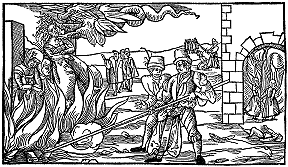 Last Sunday, June 17, but in 1782, was the last legal execution of a witch in Switzerland. From the records we know that Anna Goeldi was hanged for her heresy – as woman most often were accused – talk about a “war on women”! Roman Catholic Switzerland began the witch-hunting craze in 1427 and, along with neighboring Germany, was hell-bent on persecuting this delusion between 1580 and 1660. An especially lethal period coincided with the Thirty Years War between Catholics and Protestants in Europe. Confessions of witchcraft were often extracted under torture – and not only was torture supported by the clergy, but the accuracy of confessions acquired under torture was scripturally supported. The tide at last turned toward reason, not because God’s ministers on earth saw the light, but because the skeptical Age of Enlightenment dawned in Europe. There were a few more sputterings of witch executions: in Italy in 1791, and in Poland in 1793. But in the witch-hunting heartland, the delusion died with Anna Goeldi on this date in Glarus, Switzerland.
Last Sunday, June 17, but in 1782, was the last legal execution of a witch in Switzerland. From the records we know that Anna Goeldi was hanged for her heresy – as woman most often were accused – talk about a “war on women”! Roman Catholic Switzerland began the witch-hunting craze in 1427 and, along with neighboring Germany, was hell-bent on persecuting this delusion between 1580 and 1660. An especially lethal period coincided with the Thirty Years War between Catholics and Protestants in Europe. Confessions of witchcraft were often extracted under torture – and not only was torture supported by the clergy, but the accuracy of confessions acquired under torture was scripturally supported. The tide at last turned toward reason, not because God’s ministers on earth saw the light, but because the skeptical Age of Enlightenment dawned in Europe. There were a few more sputterings of witch executions: in Italy in 1791, and in Poland in 1793. But in the witch-hunting heartland, the delusion died with Anna Goeldi on this date in Glarus, Switzerland.
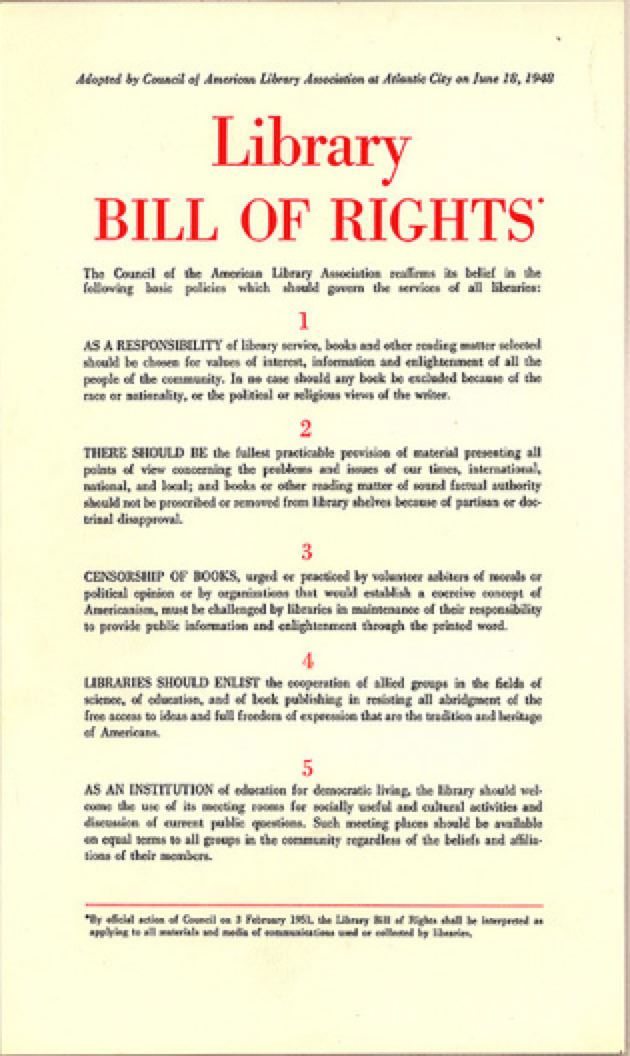 Last Monday, June 18, but in 1948, the American Library Association adopted its "Library Bill of Rights," an affirmation that libraries are charged with providing the information and ideas necessary for an informed populace and a vibrant democracy. It has been amended twice since 1948 and its current version is still less than 200 words. The "Library Bill of Rights" exhorts each library to select and to make available its information and facilities without prejudice for or against religious or political correctness, to represent a diversity of viewpoints in the materials provided, to challenge censorship and to ally with groups promoting free expression. When librarians receive a complaint about items in the collection, instead of defending or removing the material, the protester is asked to suggest something to add that would provide balance to the library collection – so the answer to speech considered offensive is more speech, not less. What a mature concept!
Last Monday, June 18, but in 1948, the American Library Association adopted its "Library Bill of Rights," an affirmation that libraries are charged with providing the information and ideas necessary for an informed populace and a vibrant democracy. It has been amended twice since 1948 and its current version is still less than 200 words. The "Library Bill of Rights" exhorts each library to select and to make available its information and facilities without prejudice for or against religious or political correctness, to represent a diversity of viewpoints in the materials provided, to challenge censorship and to ally with groups promoting free expression. When librarians receive a complaint about items in the collection, instead of defending or removing the material, the protester is asked to suggest something to add that would provide balance to the library collection – so the answer to speech considered offensive is more speech, not less. What a mature concept!
 Last Tuesday, June 19, in 1623, was also the date that French mathematician and philosopher Blaise Pascal was born. He was always in ill health, so it is tempting to attribute his preoccupation with the afterlife and God to being so close to finding out for himself. He was a contemporary of René Descartes and was ten when Galileo was forced to recant his belief that the earth circled the sun. Together with Pierre de Fermat, Pascal created the calculus of probabilities. Pascal is chiefly remembered for his Thoughts on Religion, which was published posthumously in 1870.
Last Tuesday, June 19, in 1623, was also the date that French mathematician and philosopher Blaise Pascal was born. He was always in ill health, so it is tempting to attribute his preoccupation with the afterlife and God to being so close to finding out for himself. He was a contemporary of René Descartes and was ten when Galileo was forced to recant his belief that the earth circled the sun. Together with Pierre de Fermat, Pascal created the calculus of probabilities. Pascal is chiefly remembered for his Thoughts on Religion, which was published posthumously in 1870.
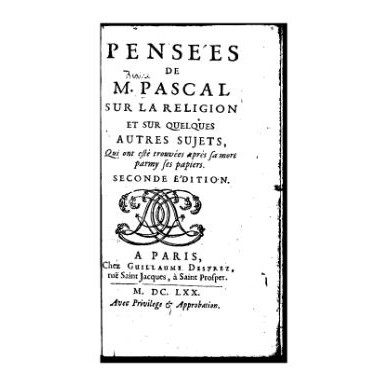 Pensées was a defense of the Christian religion, and in it Pascal makes his famous Wager, which is not as clear in his language as in this summary: “If God does not exist, the Atheist loses little by believing in him and gains little by not believing. If God does exist, the Atheist gains eternal life by believing and loses an infinite good by not believing.” So, il faut parier: we must choose.
Pensées was a defense of the Christian religion, and in it Pascal makes his famous Wager, which is not as clear in his language as in this summary: “If God does not exist, the Atheist loses little by believing in him and gains little by not believing. If God does exist, the Atheist gains eternal life by believing and loses an infinite good by not believing.” So, il faut parier: we must choose.
While the argument at first seems inescapable, there are a number of flaws in Pascal's Wager: (1) The choices are not limited to two. If God is infinitely incomprehensible, then there are infinite variations of God from which you must choose. (2) Pascal’s Wager amounts to a choice between Roman Catholicism and Atheism. But if you choose to believe in God, yet choose the wrong religion, you are in just as much peril as if you chose Atheism. (3) Believing in God, if it turns out that God does not exist, is a colossal waste of a limited life. At bottom, Pascal's Wager is a fancy way of arguing for belief based on self-interest. What if it turns out God rewards belief based on evidence and punishes belief based on selfish solicitation of reward?
 Last Wednesday, June 20, but in 1632, Cecilius Calvert, the second Lord Baltimore, was issued a charter by Charles I of England, entitling him to create a Catholic colony in the New World that became known as Maryland (where I was born). The colony of Maryland was named not for Queen Mary but for his wife, Queen Henrietta Maria de Bourbon. Much has been made of the story of how the Catholic settlers of Maryland pioneered religious toleration in the New World. Virginia was none too pleased to have a Catholic-dominated colony right next door. Here’s the interesting thing about Catholic tolerance in Maryland: Bancroft’s History of the United States (1876) examined contemporary sources and found that there were “very few Catholics” in the colony by 1654; the figure in 1640 was about 25 percent. Although Lord Baltimore offered English Catholics asylum in the new colony, few accepted. In fact, Maryland never had a Catholic majority in all of its history! So Maryland’s 1649 Act of Toleration was passed by the ruling Catholic elite to protect themselves from the Protestant majority!
Last Wednesday, June 20, but in 1632, Cecilius Calvert, the second Lord Baltimore, was issued a charter by Charles I of England, entitling him to create a Catholic colony in the New World that became known as Maryland (where I was born). The colony of Maryland was named not for Queen Mary but for his wife, Queen Henrietta Maria de Bourbon. Much has been made of the story of how the Catholic settlers of Maryland pioneered religious toleration in the New World. Virginia was none too pleased to have a Catholic-dominated colony right next door. Here’s the interesting thing about Catholic tolerance in Maryland: Bancroft’s History of the United States (1876) examined contemporary sources and found that there were “very few Catholics” in the colony by 1654; the figure in 1640 was about 25 percent. Although Lord Baltimore offered English Catholics asylum in the new colony, few accepted. In fact, Maryland never had a Catholic majority in all of its history! So Maryland’s 1649 Act of Toleration was passed by the ruling Catholic elite to protect themselves from the Protestant majority!
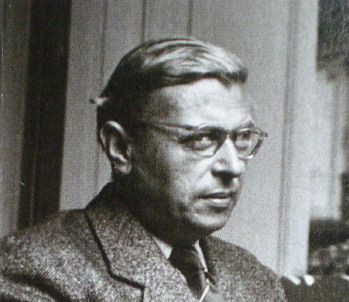 Last Thursday, June 21, but in 1905, French existentialist philosopher Jean-Paul Sartre was born. Sartre studied the writings of the German philosophers Edmund Husserl and Martin Heidegger, as well as Voltaire, Hugo, and Flaubert. He distinguished himself as a novelist and playwright, as well as a philosopher and teacher. But the Nobel laureate is chiefly known for his philosophy of Existentialism. As Sartre said in a lecture on 29 October 1945, “There are two kinds of existentialists. There are, on the one hand, the Christians ... and on the other the existential atheists, amongst whom we must place Heidegger as well as the French existentialists and myself.” Sartre's Existentialist idea was that life is meaningless and that people must fashion their own purpose out of the materials at hand; that God or Nature or whatever power may exist above mankind doesn't enforce any moral code. Summing up, Sartre said, “The existentialist ... finds it extremely embarrassing that God does not exist…”
Last Thursday, June 21, but in 1905, French existentialist philosopher Jean-Paul Sartre was born. Sartre studied the writings of the German philosophers Edmund Husserl and Martin Heidegger, as well as Voltaire, Hugo, and Flaubert. He distinguished himself as a novelist and playwright, as well as a philosopher and teacher. But the Nobel laureate is chiefly known for his philosophy of Existentialism. As Sartre said in a lecture on 29 October 1945, “There are two kinds of existentialists. There are, on the one hand, the Christians ... and on the other the existential atheists, amongst whom we must place Heidegger as well as the French existentialists and myself.” Sartre's Existentialist idea was that life is meaningless and that people must fashion their own purpose out of the materials at hand; that God or Nature or whatever power may exist above mankind doesn't enforce any moral code. Summing up, Sartre said, “The existentialist ... finds it extremely embarrassing that God does not exist…”
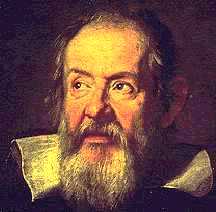 Last Friday, June 22, but in 1633, Florentine-Italian astronomer Galileo Galilei (15 February 1564 to 8 January 1642) was compelled by the Roman Catholic Inquisition to recant the theory he held that the earth travels around the sun. What seems obvious to us today was unscriptural then, and therefore by definition untrue. The ecclesiastical notion that the earth was the center of the universe was supported by passages from Joshua, Psalms and Ecclesiastes. Galileo was supported only by his observations and calculations. Galileo could have been more cautious: he well remembered the burning of Giordano Bruno for heresy only 16 years earlier. In 1633, Galileo was nearly 70 years old, going blind, and in frail health. It took little to bully him into recanting the sun-centered theory. If it demonstrates anything, Galileo’s recantation demonstrates that you cannot choose what you believe, or be compelled to believe something. The story of Galileo shows that you can believe only insofar as you are convinced.
Last Friday, June 22, but in 1633, Florentine-Italian astronomer Galileo Galilei (15 February 1564 to 8 January 1642) was compelled by the Roman Catholic Inquisition to recant the theory he held that the earth travels around the sun. What seems obvious to us today was unscriptural then, and therefore by definition untrue. The ecclesiastical notion that the earth was the center of the universe was supported by passages from Joshua, Psalms and Ecclesiastes. Galileo was supported only by his observations and calculations. Galileo could have been more cautious: he well remembered the burning of Giordano Bruno for heresy only 16 years earlier. In 1633, Galileo was nearly 70 years old, going blind, and in frail health. It took little to bully him into recanting the sun-centered theory. If it demonstrates anything, Galileo’s recantation demonstrates that you cannot choose what you believe, or be compelled to believe something. The story of Galileo shows that you can believe only insofar as you are convinced.
 Today, June 23, but in 1964, third-generation TV writer and “Buffy the Vampire Slayer” series creator Joss Whedon was born. In a 2002 Onion AV Club article, entitled “Is There A God?”, Whedon was asked the question. “No,” he replied. Pressing on, The Onion asked, “That’s it, end of story, no?” Whedon said, “Absolutely not. That’s a very important and necessary thing to learn.” In a Q&A session promoting his 2005 movie Serenity, writer-director Whedon was asked: “What do you have against being a Christian?” He answered in part, “I don't actually have anything against anybody, unless their belief precludes everybody else. I am an atheist and an absurdist and have been for many, many years. … So the answer is: ‘Nothing, unless you've got something against me.’”
Today, June 23, but in 1964, third-generation TV writer and “Buffy the Vampire Slayer” series creator Joss Whedon was born. In a 2002 Onion AV Club article, entitled “Is There A God?”, Whedon was asked the question. “No,” he replied. Pressing on, The Onion asked, “That’s it, end of story, no?” Whedon said, “Absolutely not. That’s a very important and necessary thing to learn.” In a Q&A session promoting his 2005 movie Serenity, writer-director Whedon was asked: “What do you have against being a Christian?” He answered in part, “I don't actually have anything against anybody, unless their belief precludes everybody else. I am an atheist and an absurdist and have been for many, many years. … So the answer is: ‘Nothing, unless you've got something against me.’”
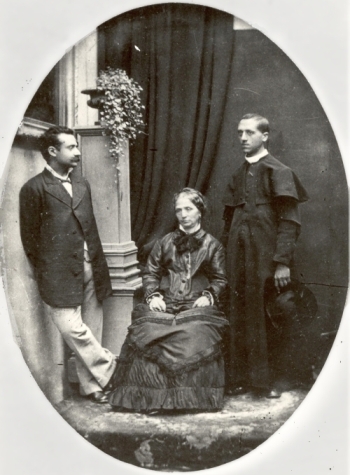 Finally, it was on today’s date, June 23, in 1858, that 6-year-old Edgardo Mortara was kidnapped from his Jewish parents in Bologna, Italy, by agents of the Inquisition, under the Dominican Father Feletti. The parents, Momolo and Marianna Mortara, later learned that their Christian maid, Anna Morsi, had secretly baptized the boy when he was ill, fearing that he would go to hell if he died a Jew. The Pope's police force spirited little Edgardo to Rome, to a home built with funds from taxes levied on Jews. Appeals for Edgardo's release – from Jewish organizations, intellectuals and government officials in Britain, Germany, Austria, the US and France, as well as French Emperor Napoleon III, whose troops protected the Pope – were to no avail. Instead, the 66-year-old pope smirked, “I couldn’t care less what the world thinks.” The kidnapping of Edgardo Mortara tipped Italy toward unification and erased the power of the Vatican over the Papal States. Italian unification dates from 1870; Pius IX died eight years later, his Dominican hounds defanged. Edgardo Mortara actually stayed a Catholic, dying a priest in a Belgian monastery at age 88 in 1940. However, the kidnapping was a failure in the long term: liberalism and anti-clericalism took hold in Italy and has not faltered to this day.
Finally, it was on today’s date, June 23, in 1858, that 6-year-old Edgardo Mortara was kidnapped from his Jewish parents in Bologna, Italy, by agents of the Inquisition, under the Dominican Father Feletti. The parents, Momolo and Marianna Mortara, later learned that their Christian maid, Anna Morsi, had secretly baptized the boy when he was ill, fearing that he would go to hell if he died a Jew. The Pope's police force spirited little Edgardo to Rome, to a home built with funds from taxes levied on Jews. Appeals for Edgardo's release – from Jewish organizations, intellectuals and government officials in Britain, Germany, Austria, the US and France, as well as French Emperor Napoleon III, whose troops protected the Pope – were to no avail. Instead, the 66-year-old pope smirked, “I couldn’t care less what the world thinks.” The kidnapping of Edgardo Mortara tipped Italy toward unification and erased the power of the Vatican over the Papal States. Italian unification dates from 1870; Pius IX died eight years later, his Dominican hounds defanged. Edgardo Mortara actually stayed a Catholic, dying a priest in a Belgian monastery at age 88 in 1940. However, the kidnapping was a failure in the long term: liberalism and anti-clericalism took hold in Italy and has not faltered to this day.
We can look back, but the Golden Age of Freethought is now. You can find full versions of these pages in Freethought history at the links in the American Heathen blog, which take you to my blog, FreethoughtAlmanac.com.

